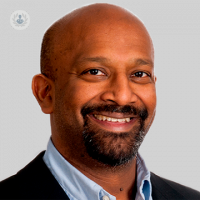What is salivary gland surgery?
Autore:In his latest online article, Mr Ram Moorthy gives us his insights into salivary gland surgery. He explains what it is, the different types, what conditions are needed for surgery, the risks involved and the recovery.

What is salivary gland surgery?
The body produces saliva, which serves to lubricate our mouth. Saliva is produced by two main glands: the parotid gland located in front of the ear, and the submandibular gland situated under the jawbone. These major salivary glands can be impacted by growths, blockages, or infections, and in certain cases, their removal may be necessary to address the issue. Additionally, there are numerous minor salivary glands that pose a distinct set of challenges and conditions.
Are there different types?
Depending on the specific condition, two different approaches are used for gland removal. The traditional open procedure involves making an incision on the neck or side of the face and neck to access and remove the affected glands.
However, for certain conditions like salivary duct stones or obstructions, modern minimally invasive techniques are preferred. These advanced methods utilise tiny cameras called endoscopes, which enable us to address the problem with greater effectiveness and safety for patients, without leaving any visible scars.
What conditions cause the need for salivary gland surgery?
The cases I mainly handle involve issues with the saliva glands, which include the presence of growths like benign tumours or cancers, necessitating their removal. Alternatively, obstruction in the gland, often caused by salivary gland stones, can lead to swelling, pain, and complications for the patients.
For such cases, I refer my patients to colleagues who specialise in minimally invasive surgery, specifically for removing stones and addressing any other obstructive causes.
What are the risks involved in salivary gland surgery?
Let's talk about the parotid gland, the larger gland located in front of the ear. My specialty involves performing this procedure with an aim for an invisible scar, which is achievable for many patients by approaching it from behind the ear instead of the traditional front-of-the-ear-to-neck approach.
However, this type of surgery carries some inherent risks. There is a risk of bleeding and infection due to the proximity to the skull. As the facial nerve runs through the gland, preserving it during the operation is crucial, but it carries a small risk of injury, potentially leading to facial weakness. There's also a chance of fluid or saliva buildup under the skin, which might necessitate drainage. Patients may experience numbness, and there is a slight risk of symptoms returning, requiring further treatment or surgery.
The other major salivary gland, the submandibular gland, is approached through an incision on the neck. This approach also presents some risks, including scar formation. There is a risk of damaging nearby nerves that control the corner of our mouth, taste sensations on the tongue, and movement of the tongue. Again, there are risks of bleeding, infection, and the possibility of the tumour returning, this could lead to additional surgery or treatment.
How long does it take to recover from salivary gland surgery?
Generally, for this type of surgery, we recommend an overnight hospital stay, although we are striving to perform more of these cases as day surgeries. After the procedure, we generally advise patients to take two weeks off from work to recover comfortably at home and ensure proper healing of the wound. Once they have recuperated during this period, they can gradually resume their regular activities.
Mr Ram Moorthy is a highly respected ENT specialist with over 20 years of experience. You can book an appointment with Mr Moorthy today on his Top Doctors profile.



